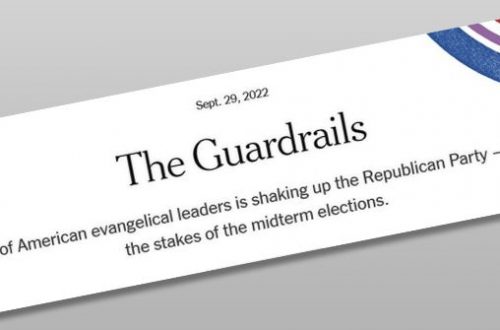 Tim Challies offers a counterpoint to John Piper’s claim that Christianity has a “masculine feel.” Challies writes:
Tim Challies offers a counterpoint to John Piper’s claim that Christianity has a “masculine feel.” Challies writes:
John Piper sparked quite a storm with his biographical message on the “frank and manly” J. C. Ryle. One of his conclusion was that Christianity is meant to have a masculine feel to it… I find that I do not agree. For those of you who are given to over-reaction, just breathe—I am allowed to disagree and I’m sure Piper is just fine with people disagreeing. If you don’t have a category for charitable disagreement on secondary matters, you need to develop one! I still love the man, but want to offer an alternative to his masculine Christianity.
Read the rest here.




6 Comments
Pingback:
Reg Schofield
Totally disagree with Tim on this one . Reading through the Bible , as my wife has said , it distinctly has a masculine feel to it . Tim didn’t really in my opinion interact with what Piper was saying .
Chris Taylor
Tim’s essay pretty much sums up why I’m not crazy about complemetarianism.
I don’t have a good answer myself, but when I read this,
God created (A/a)dam in his own image,
In the image of God he created him,
Male and female he created them [Adam and Eve].
I wonder how the ‘him’ works here. He created ‘him’ in God’s image. From what I can see in the NT, woman was created to image forth the church, not the glory of God. In fact, Paul states clearly that man displays the glory of God, whereas woman displays the glory of man.
Have I not read enough, or do complementarians simply avoid these aspects in their writings?
Suzanne Mccarthy
Yes, I think one can view the Bible as having a “masculine” feel But the woman of God absolutely must also display the same “masculine” characteristics. The woman of God is chayel in Hebrew, the same word used for “mighty” in the expression “mighty men.” The woman of God is also andreia, meaning “brave” or “manly.” Its impossible to get away from. The woman of God must display the same characteristics as the man of God. She must be strong, courageous, generous, sober and ready to be a martyr. In the early church, some women of God were martyrs, some teachers, some wealthy patrons, and landowners. We meet these women in the Bible.
The Bible does not distinguish between feminine and masculine attributes. If an attribute is noble it is thought of as “masculine”, but woman must have it equally. If an attribute relates to feeding others, it may evoke a feminine metaphor, but men like Moses and Paul identified with the nursing mother. There simply was no divide in spiritual terms.
So a female leader, historically, a female martyr for example, displays “andreia” that “manly” virtue, and women are just as appropriate in their being as exemplars of Christianity as men are.
Jack Riley
Great job, Challies! My manly, man guy friends who were recently pagan and became true Christ followers have otten told me how much their assumptions of manhood are challenged by the teaching of Jesus, Paul, Peter, John and the rest of the NT. They are thankful for the paradigm shift that true Godliness is producing in them and in their relationships.
Nathan Cesal
Challies doesn’t define femininity or masculinity: “Whatever masculinity and femininity are…” “Whatever femininity is…” “Whatever masculinity is…” He then concludes, “[T]he church needs to go on encouraging men to be masculine and women to be feminine.” This doesn’t say much because the reader has to suppose what this really means — each reader will have his own thoughts and I would most likely just “trot out [some] gender stereotypes” which Challies indicates is a problem.